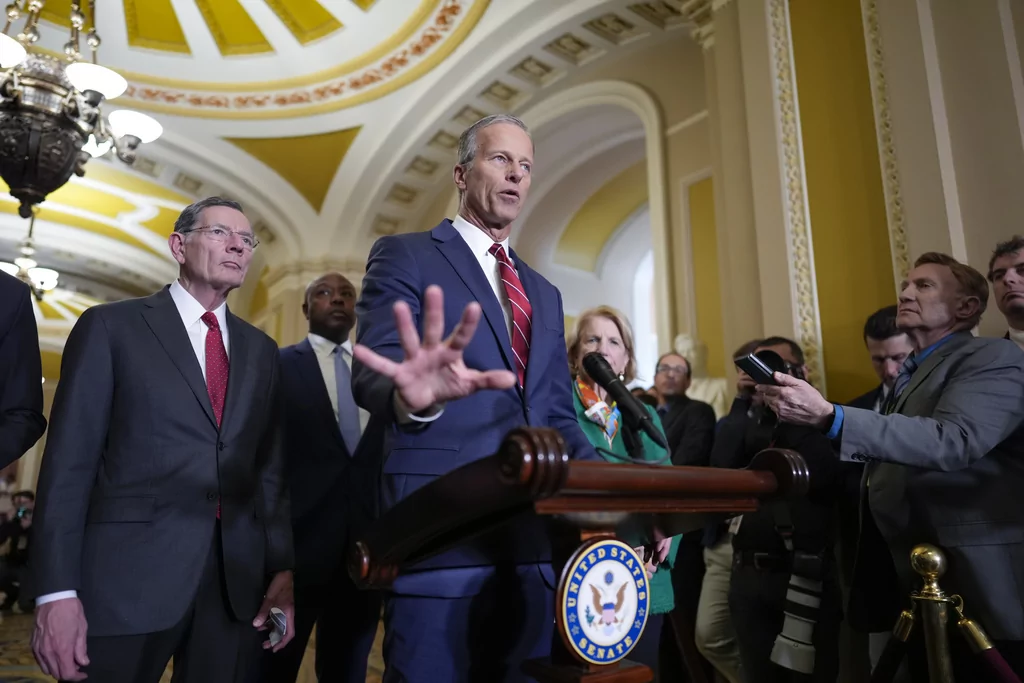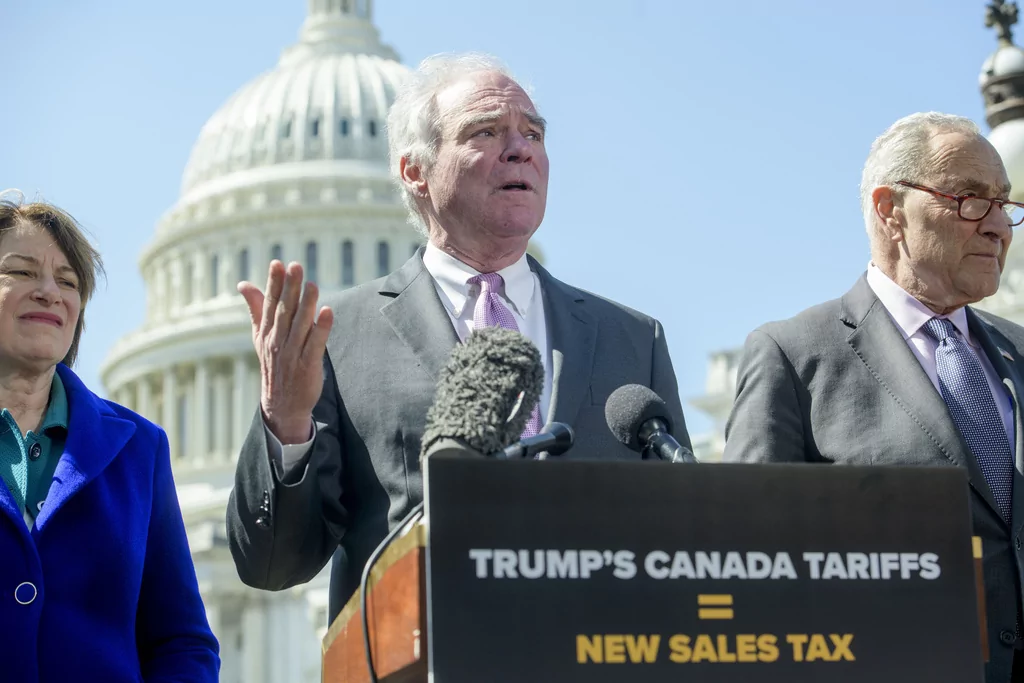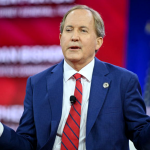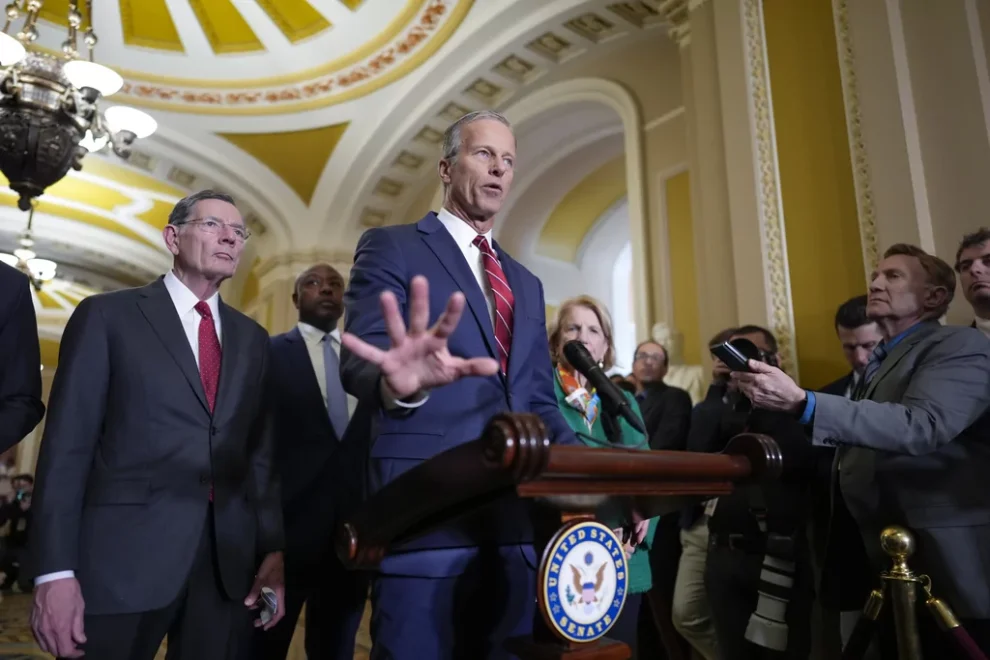President Donald Trump’s so-called Liberation Day of tariffs arrived Wednesday against the backdrop of a nervous and confused Republican Party over which countries and goods will be affected.
Meanwhile, Trump was on the cusp of what could amount to the biggest policy snub of his second term as some Senate Republicans weighed whether to side with Democrats on a bipartisan measure to overturn his Canadian tariffs.
“I think all of us are anxious to see … what the president actually comes out with in terms of tariff policy,” Senate Majority Leader John Thune (R-SD) told reporters.
It’s unclear exactly how broad Trump’s new tariffs, import taxes on foreign goods, will be, which countries or products they will apply to, or at what rates. But one thing does appear certain: The new tariff rates will go into effect “immediately” once announced, according to the White House.
On Tuesday, Trump’s tariffs announcement was notably pushed back by one hour on Wednesday to 4 p.m., after U.S. stock markets close. Trump’s prior comments and decisions on tariffs have roiled the markets, and the expectation is for further volatility in response to his announcement. Sweeping “reciprocal” tariffs on virtually all trading partners would likely cause markets to tumble the following morning.
“The president will be announcing a tariff plan that will roll back the unfair trade practices that have been ripping off our country for decades,” White House press secretary Karoline Leavitt told reporters. “He’s doing this in the best interest of the American worker.”
Trump is vowing to use tariffs, taxes on imported goods that are typically passed to consumers in the form of price increases, to boost domestic manufacturing and reset trade disparities between the United States and foreign trading partners. But even as the president and his administration reject the inflationary aspects of tariffs, senior White House aide for trade and manufacturing Peter Navarro projects that the U.S. could rake in an eye-popping $6 trillion over the next decade in additional taxes from Trump’s tariffs.
Sen. Kevin Cramer (R-ND) said he “hate[s] the idea personally of using tariffs as a revenue score” but that firming up tariff policies Trump has teased for months will provide economic certainty and jumpstart trade negotiations.

“Setting a more certain baseline on tariffs and more specificity allows us to start planning for the new circumstance, and then to start negotiating it item by item, country by country, product by product, and see what the rules are for waivers,” Cramer added.
Senate Republicans will face their latest test on Trump’s trade agenda in a vote that is likely to occur in the hours before his tariff announcement, setting the stage for a possible high-stakes showdown.
Sen. Rand Paul (R-KY) joined forces with a trio of Democrats — Sens. Time Kaine (D-VA), Mark Warner (D-VA), and Amy Klobuchar (D-MN) — to force a vote on a privileged measure to overturn Trump’s emergency declaration on fentanyl that was used to impose a 25% tariff on Canada. Only a simple majority is required, which means Democrats would need at least four GOP senators to break rank.
As of Tuesday, the only Republicans who appeared ready to do so were Paul and Sen. Susan Collins (R-ME). But Paul and Kaine expressed optimism that more would join them.
“Taxes, under the Constitution, are supposed to originate in the House, then come to the Senate. But they’re certainly not to be passed by a president, with only the president voting in favor of them, and no vote by Congress,” Paul said. “Congress is guilty over decades of giving this power to the administration.”
Advancing American Freedom, the conservative think tank started by Trump’s former vice president, Mike Pence, is among those urging lawmakers to curtail the emergency powers Trump used for the tariffs. The group’s general counsel, J. Marc Wheat, wrote that Trump’s unilateral tariff power “raises a serious constitutional question,” according to a letter sent to lawmakers that was provided to the Washington Examiner.

“Congress has a constitutional responsibility to reclaim its authority over taxation,” Wheat told lawmakers, citing legislation from Sen. Mike Lee (R-UT) and Rep. Chip Roy (R-TX) to require congressional approval of such national emergency declarations. Trump used the same authority to issue tariffs on Mexico and China.
Democrats accused their GOP colleagues unwilling to buck Trump of enabling him to conjure up faux national emergencies to enact his tariffs agenda and raise tax revenue to extend 2017-era tax cuts from Trump’s first term that will expire this year.
“The emergency is being invented to do the tariffs, to do the taxes on everyday Americans. Why? So they can use the tariff revenue to give a tax cut to billionaires,” Kaine said.
But even if the Senate were to deliver Trump a blow, House Republicans have ensured it would only be symbolic. Last month, they took action to block the Senate or House members from forcing them to hold future votes on Trump’s tariffs, a procedural workaround that Paul assailed as “obscene.”
“This isn’t blind faith — remember what he accomplished in the first administration before COVID,” House Speaker Mike Johnson (R-LA) told reporters of Trump’s tariffs. “It may be rocky in the beginning, but I think that this will make sense for Americans.”
WHICH ITEMS WOULD BE AFFECTED BY TRUMP’S PROPOSED TARIFFS ON CANADA AND MEXICO
In the latest sign of the anxieties building around Trump’s “Liberation Day” tariffs, Senate GOP leaders dodged questions about Americans facing higher costs as they defended the president’s broad executive authority and lobbied Republicans against overturning the Canadian tariffs.
Thune, citing fentanyl that has come into the U.S. from Canada and Mexico that Trump used to impose the tariffs, said the president “needs to have tools at his disposal to deal with, what I think, are national emergencies.”
Rachel Schilke contributed to this report.
























